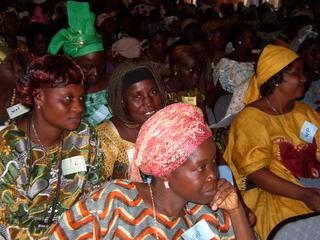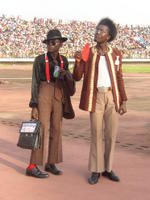
Today is the beginning of the Liberian Women’s National Political Forum – a 3-day discussion about the challenges and opportunities out there for us as we head to October elections and a chance to change our lives and our nation.
The ballroom of the Monrovia City Hall is full of women in colorful lappa suits with matching head-ties. The atmosphere is lively and full of excited chatter. We are the same women who helped to bring an end to the war, and we are here to make sure our voices remain loud, clear, and effective.
Our keynote speaker is Dr. Nemata Eshun Baiden, education and training consultant, and founder of the 50/50 Group of Sierra Leone. She tells us she was absolutely overwhelmed by the invitation to address Liberian women on this historic occasion. “After all the muddy water under the bridge between our two countries and their civil wars,” she says, her voice full of emotion, “we still see each other as sisters.”
Grace. It is the first word that pops into my head, and the best word I can think of to describe this readiness to choose love over hate. Another example of this kind of grace comes to mind. Just last month I met a quiet, young teenage girl. While fleeing the fighting between government and rebel forces five years ago, she was abducted, raped, and never again reunited with her family. Nine months after the traumatic incident, all alone in this world, she gave birth to twins. “What are their names?” I asked her. She smiled and answered, “Blessed, and Blessing.”
Grace.
Of course we still see each other as sisters – women from Liberia and women from Sierra Leone. Our sisterhood is a fact that cannot be erased by bitterness, greed, or any of the things that make humans hate each other. Together we gave birth to nations, together we suffered the brunt of the atrocities in our wars, and together we still hold up half the sky.
It is breathtaking to imagine what women’s full participation in politics could do for Liberia. We would reconcile our people, stamp out corruption, protect our environment, feed our nation, and educate all our children. That would just be the beginning. Too optimistic? No. With women, nothing is impossible – we have the power, and we definitely have the grace.

